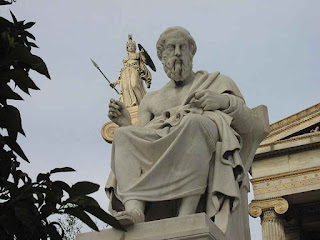It's not hard to understand the modern left, really. So long as you jettison all that bunk about the working class and the poor. Pierre Trudeau said it fairly straight, long ago, when he was asked, running for the Liberal leadership, if he was a Marxist. He replied that his political philosophy came from Plato's Republic.
 |
| The True Founder of the Left. |
The left's fundamental belief is that of Plato: that the ideal society should be run by a meritocracy of the best and the brightest, of the enlightened, of the learned.
Besides Plato, it is the teaching of Confucius. It is also in the spirit of Rabbinical Judaism.
So why conceal it, consciously or not, behind a smokescreen of Marxist talk about the working class? The working class really just does not figure here. First, I think, because their idea is undemocratic, and so a bit of a challenge to get past the majority of voters who become the ruled. The obvious ploy is here used: claim it is all for their best interests, that they are under threat from some powerful enemy (the rich capitalists), and that they, ordinary folks on the street, are somehow the ones being empowered.
 |
| The Leftist is on the Left; the Red is wearing Red. Aristotle is in Tory Blue. |
But in reality, the power must be held, perhaps “temporarily,” by a “vanguard” movement. Which is of course not working class at all. Trudeau, Rae, Obama, Kerry, Gore, Kennedy, Castro, Guevara, Mao, Lenin—none of these are working class, or even a generation away from working class. They are all professionals.
If they get away with it, it kind of proves their point: that the working classes are easily manipulated and so not competent to mind their own affairs.
 |
| "Relying on Mao Zedong Thought; Making the Revolution." |
The second problem with telling the truth about the agenda of the left is that this doctrine of rule by experts goes against Christian gospel, which condemns the professional class in very plain and consistent terms, as the “scribes and Pharisees.” The suggestion is that such a system is inevitably oppressive over time. And so it has been, historically. Such a rule by a professional elite was the essence of Communism in Eastern Europe, Latin America and Asia over the past century. In Bulgaria, I met an older tour guide who lamented that, nowadays, nobody cared about his proper credentials any more. Just about anyone could be a tour guide now if they could do the job.
This is why leftist regimes always emphasize health and education: more money and more power for doctors and academics.
Nazi Germany, although it had its genuine working class element, was also a rule by professional elite. The party's support was nowhere stronger than among university students and academics. As is the left's support today.
The third problem with telling the truth is that the idea of meritocracy tends to violate the idea of human equality. True, a real meritocracy would not discriminate on the basis of class, race, or sex. But it assumes, on the other hand, that human capacities are radically different on the basis of education or training. This in turn is concealed behind a smokescreen of stressing equality in terms of race and sex.
 |
| Soviet Poster: "The Illiterate is a Blind Man." |
Yet against all this, it seems only common sense that those most qualified to run the world are the professionals, the experts, the well-educated. What's so wrong about that? Wouldn't everyone be better off? I listened only recently to a MSM commentator, an editor for Slate magazine, making just this argument for the case that China currently had a pretty good government.
We are speaking, after all, not of a ruling class by birth, but one by proven merit.
Unfortunately, as a Christian, I am inclined to believe that Jesus was right about all this, and Pharisaism is not a productive or moral way to run things. As he noted, and as history seems to prove, meritocracies of this sort become oppressive.
First, it is intrinsically unlikely to suppose that another person, who does not know you, can tend to your best interests better than you can, even with all the best motives in the world. He does not know you as well as you do, and people do not vary that greatly in their intellectual capacities. This is where the left really believes in extreme human inequality. Only on this assumption of extreem human inequality would the rule by experts make sense. Christianity teaches, instead, that we are all equal in the sight of God, and all necessarily competent, independent moral agents—otherwise there is no salvation.
Second, not ourselves being God, how do we determine who is an expert? Classically, other experts decide—but how do we know they are truly expert? We have to have some objective test to ensure that we have something more here than a randomly self-selected, self-perpetuating clique. The education system is the one the meritocrats tend to rely upon. But that retains the problem: are those who set the curriculum and the tests the real experts, and are their solutions the best? Might a lone genius always fail the test by seeing something better?
The two most obvious checks are, firstly, a free market in expertise, and secondly, a democracy, in which the popular will is sovereign over the legal and educational system. The left, and professions generally, is rather opposed to both of these checks. Indeed, forming into an profession is by its essential nature a restraint on the free market and the popular will.
The religious priesthoods have their own such checks and balances: celibacy, for one, as a test of sincerity. The left, inevitably, is opposed to this as well. For military professionals, the success or failure of actual military operations is the great objective check. Science and engineering have their own objective check, that of reproducible results; and, even more, of bridges not actually falling down.
Interestingly, these professions that face regular objective checks tend to be less leftward-leaning than the others. Indeed, to the extent to which a profession or area of expertise is identifiably political, ideological and leftist in its corporate stance, and opposed to objective checks, to that extent we can fairly assume it is not a real collection of experts but a self-selecting, self-perpetuating clique.
The third problem with this sort of professional meritocracy, as hinted at previously, is that there is an inevitable danger that even true experts will not be, by that qualification, paragons of disinterested virtue. Give any group special powers and privileges, and they are entirely likely to exercise them, not for the public good, but in their own self-interest.
The stance of the left is based, implicitly or explicitly, on the assumption of the moral superiority of the professional class. They are to be given power because, unlike the merchant class, they are not motivated by money, greed, or profit. Unlike the working class, they do not cling in ignorance to their guns and their religion.
Yet there is absolutely no basis for this. Once, when any academic training necessarily included a rigorous education in a religious tradition, and any awarded degree was a ministerial license, it might have had some theoretical basis. Although the New Testament will not accept this argument. But now, when there is no moral or theological component to the typical education, there is no argument for professionals being any less greedy, power-hungry, slothful, deceitful, or lascivious than the average man. Giving them special powers and privileges, therefore, is simply giving them a license to exploit the rest to their own advantage. As Adam Smith observed, no group of men involved in the same trade can ever meet, even in relaxation, without the meeting becoming in time a conspiracy against the public good. We understand this, and act accordingly, in the case of merchants and manufacturers. We act as if the opposite is the case in the professions. This is mad.
Besides comparisons of Denmark to Bulgaria, we can see the failure of the left-wing meritocratic ideal in detail in real life. Compare the urban-planned spaghetti junction suburbs of the fifties and later with organically-developed older towns and inner cities. Which is a more amenable environment—that created by the urban-planning experts, or that created by people working out what they wanted for themselves? To my mind, there is no question.
Consider the quality of “journalism” since reporters formed themselves into a profession in about the nineteen-sixties. Have newspapers and magazines and television news gotten better since? No, they have entered a downward slide, to the point that traditional newspapers, magazines, and network news are dying now all around us. Yes, it is the technology, but that is not the whole story. Established news organizations should have been able to move to the new technology and still dominate, with a superior “professional” product. The problem faced by the journalism profession is that they are too easily faced now with open competition from outside the profession, and cannot compete successfully. The professionals simply are not as good as amateurs outside the profession.
One sees the same deterioration in the public schools, since “educators” formed themselves into a profession at about the same time. Quality goes down and costs go up as a profession turns from serving the customer to serving their self-interest. The boom in homeschooling, and all the available statistics on it, show that the amateurs here too can consistently outperform the profession.
The same is doubtless true of many other professions. Moreover, the domination of the professions, which has grown by leaps and bounds since the Second World War, can be seen to account for a lot of our current financial problems in the developed world. The growing cost of education; the growing cost of health care; the growing cost of malpractice insurance; the growing pension burden in the public service. They are largely due to the parasitism of the professions on the larger society.
One possible partial solution would be to reintroduce a religious underpinning to all professional education. That, I think, would help, but the New Testament says it would not be enough.
More promising is the growing role of technology and globalization in creating a true free market in expertise. Let's hope.









































